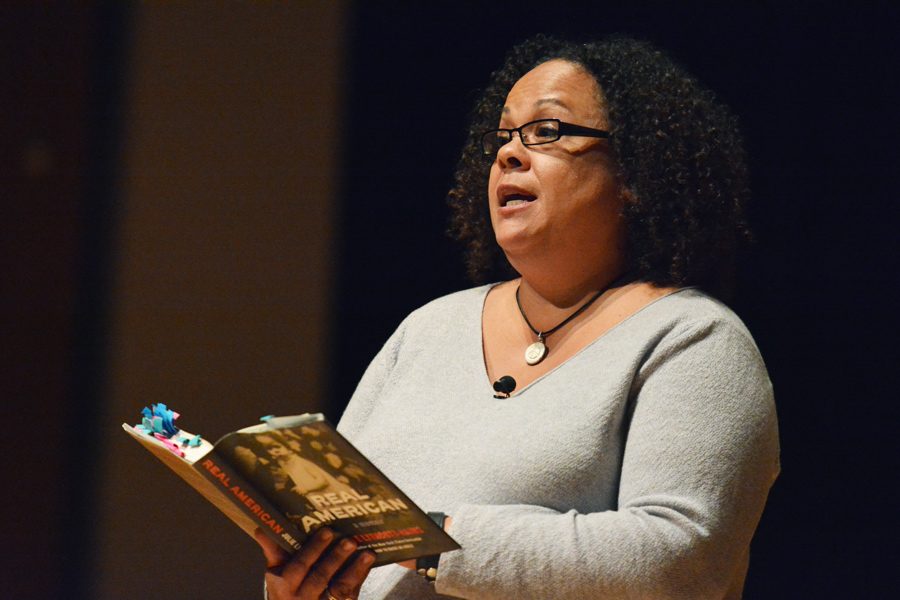California author talks growing up biracial in America at ETHS event
Oreste Visenti/The Daily Northwestern
Author Julie Lythcott-Haims discusses her experience growing up biracial in the United States. Lythcott-Haims, who identifies as black, said blackness is a combination of ancestry and consciousness.
November 14, 2017
Julie Lythcott-Haims said she spent much of her life trying not to be black. She said she vividly remembers the first time she was called the N-word as a teenager.
She was serving as the student body president of her majority-white high school when someone wrote it on her locker. She did not tell anyone, but rather “took it in” and tried “never to be that word again.”
At Evanston Township High School on Monday, the California author discussed her new book, “Real American” — a memoir detailing her acceptance of her biracial identity and her experience living as a person of color in America. Family Action Network, a nonprofit that curates free speaker series on a variety of topics, organized the event.
“This is my journey of how I learned to locate a self I could love as a black person with a white mother in a country where black lives weren’t meant to matter,” Lythcott-Haims said.
In front of roughly 100 people, Lythcott-Haims read sections from her book and spoke with Chicago poet Tara Betts about the country’s racial tensions.
The book was intentionally structured to invert a traditional plot, Lythcott-Haims said, written in prose-poetry form to contrast with other, more traditional memoirs.
Lythcott-Haims identifies as black, and said blackness is a combination of ancestry and consciousness. As a parent, she said it’s important that she talks to her children about being the descendants of slaves.
However, she said, finding her own racial identity was a process. As a girl, she was “desperate to belong” to her majority-white community and possessed a great deal of self-loathing. As an adult, she said she came to embrace her anger through social advocacy.
Lythcott-Haims said the Black Lives Matter movement in particular gave her a sense of agency around racial justice. She began to tear up when talking about seeing her own son in Trayvon Martin, Tamir Rice and Michael Brown — black men who died at the hands of police.
“We have decided that brown skin is a credible threat,” Lythcott-Haims said. “That’s what American racism has done. It is embedded in the psyche and the (minds) of so many.”
FAN executive director Lonnie Stonitsch told The Daily that Evanston has a mixed-race and mixed-income community, and residents are interested in talking about race. She said FAN welcomed Lythcott-Haims again after she came to ETHS two years ago.
“Julie is direct, funny, insightful, compassionate and eloquent,” Stonitsch said.
Highland Park resident Hilde Carter told The Daily she had more support than Lythcott-Haims while growing up because she was surrounded by a strong black community.
However, Carter said she agreed with Lythcott-Haims’ points regarding racial tension. She and her friend Jann Tyler, a realtor in Winnetka, said racial identity comes from immediate family more than anything else.
“You can instill in your children a sense of self and you have a good rapport with them so they can tell you that things are happening that are disturbing to them,” Tyler said. “But you can’t run away from (race).”
Email: catherinehenderson2021@u.northwestern.edu
Twitter: @caity_henderson



